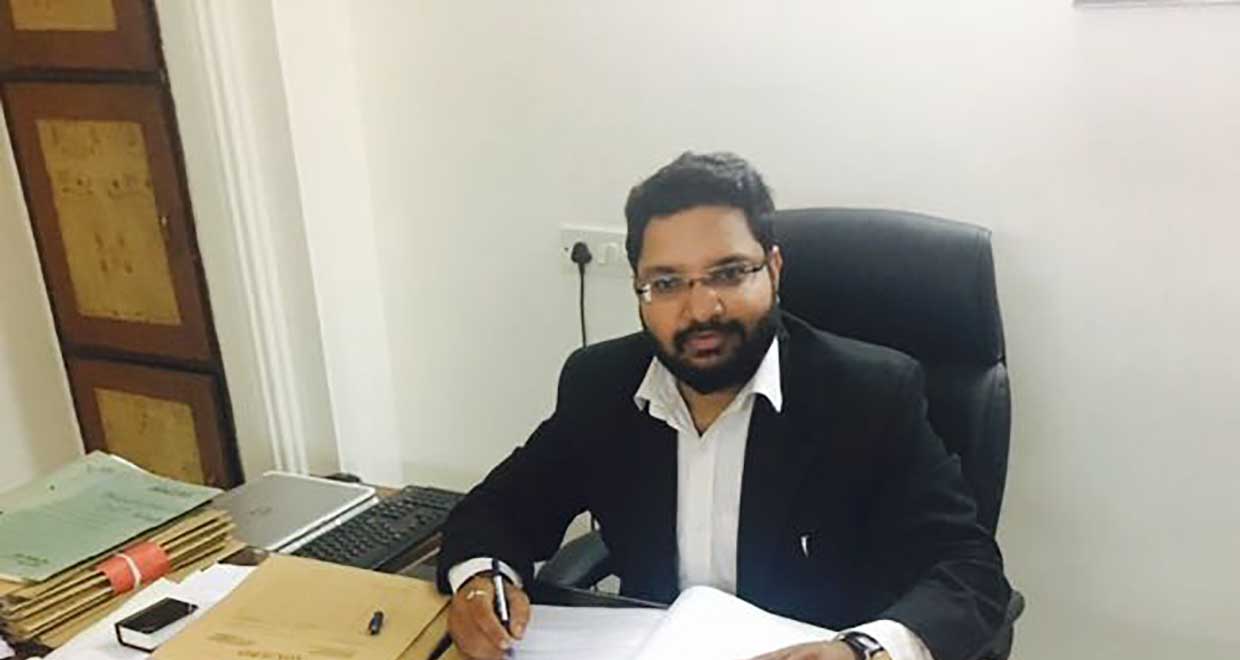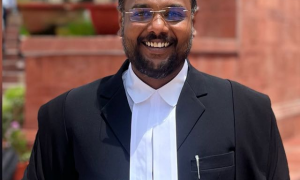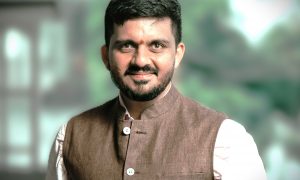Prashant Chandra graduated from Campus Law Centre, Faculty of Law, University of Delhi in 2011. He is a diligent and well read lawyer with acute legal acumen and professional commitment.
With more than 3 yrs into litigation, he has handled the panel work of ICICI Bank, HDFC Bank, HDFC Standard Life Insurance Co., TATA AIA Insurance Co., Future Generali Life Insurance Co. and Aviva Life insurance Co. before various Forums/NCDRC along with trail in civil disputes viz. recovery, service, property matters before Delhi High Court and various District Courts of Delhi. At present, he is working as an associate at Vox Juris.
In this interview he talks to us about:
- Challenges he faced as an advocate in Delhi High Court.
- Importance of mooting and academic writing.
- Difference between a practice in a High Court and the Supreme Court.
- How he decided to write his book “The Tumult over Law of Homosexuality”.
What would be a brief introduction of you?
I am a first generation lawyer. I am dedicated towards my work and very passionate for litigation. I come from a family of academicians and government employees. Throughout my student life I have been very active in various extracurricular activities and been involved in different vocations. I did LL.B. as 3yrs law course after my graduation so I had enough time to be involved in different professions. After having experience in different fields, I finally chose litigation as profession since it keeps me in a constant phase of motivation, gives me a chance to daily improve myself and achieve whatever I desire.
Please elaborate on the motivating factors which helped you in choosing legal studies.
Throughout my life I have been inquisitive about only two aspects related to anything- Firstly, the science behind a particular thing and secondly, the logic behind existence of that particular thing in that particular form. The science part involves all the technical knowhow of invention and things related to chemistry and physics whereas the logic part involves all the issues related to the rules/law governing that particular thing.
Simply put, whenever I use any object, say a pen, the first two questions which come in my mind are: (1.) How that particular pen was crafted viz. ink put in a sleek tube/refill, writing tip made etc. (2.) Who determines the specifications related to a pen, what standards are to be maintained, what size and characteristics of a pen should be set, so as to give it a standard definition. When we look answers for such questions, we find that there is a Ball Point Pens and Refills Committee, formed by Indian Standard Institution regulating the manufacturing details of ball pens. Since I couldn’t cope up with chemistry, I decided at the initial stage of my career that I’d pursue my career in a direction which doesn’t involve studying science and would devote my time in answering the second question i.e. knowing the law governing the society.
Were there any activities you participated in that honed your skills as a litigator? How are they relevant now?
In 1st year of LL.B., I was able to qualify as a member of Moot Court Society, CLC, Faculty of Law, University of Delhi. Later on I kept myself engaged as participant as well as volunteer in other Moot Court Competitions organized in Faculty of Law. In 2nd year of LL.B., I did internship in Supreme Court of India. In 3rd year, I did internship in District Courts of Delhi and for two months in Dehradun District Court also.
How did you prepare for the Bar in a span of a few months?
I collected the material and question papers of previous years AIBE from my friends and prepared accordingly. It’s an open book paper so I also took those books and few bare acts. While preparing for AIBE along with the main portion of law one should focus on the practical aspect of law viz. limitation periods, date of amendments, punishments prescribed for major offences, authority of judges etc.
What are the challenges of being an advocate in the Delhi High Court?
Yes, it’s true that being an advocate in Delhi High Court is quite challenging because there is a lot of competition in Delhi High Court. But the presumption that a first generation lawyer cannot survive in Delhi High Court is a myth. The merit is always appreciated in Delhi High Court, if you are well read and prepared to present your case the way it should be presented, then you will definitely get the relief you desire. The quote; “first deserve then desire” is applicable in its strict sense in Delhi High Court.
What are the main types of cases you focus on?
My area of litigation is writ petitions/appeals/LPA/revision etc at High Court of Delhi and all type civil matters viz. cases related to contracts, specific performance, service matters, executions etc. Recently I have also started practicing at criminal side with few astute and experienced lawyers having vast experience of criminal trial.
What is the most challenging case you ever faced? Is there any case that changed your perspective on the judicial system?
The most challenging case I ever faced was in Supreme Court of India related to service matter, termination of a Class I officer on grounds of alleged misconduct. The most challenging part in that case was its 6 years of dismissal owing to incomplete and improper presentation of case in several rounds of litigations before Delhi High Court and also few applications at Supreme Court. However, at the stage of SLP, after thorough research, precise drafting and proper presentation of the case I along with other advocates of my team, were able to get the desired relief and was able to get that employee reinstated from the Supreme Court of India. Further, I am a firm believer that our judicial system is fair and reasonable with eminent judges sitting at the helm of Justice and there has not been any case which could change my perspective on the judicial system.
How important do you think mooting and academic writing are for a law student aspiring to become an advocate?
Mooting is very important for a student who aspires to become a lawyer. It gives you confidence, exposure and removes your hitch to present your case. Mooting helps you become an advocate and experience what lies ahead of you, even before clearing your exams. As far as academic writing is concerned it is also helpful to supplement your research. Instead of only discussing a case law at tea stall or criticizing some High Court/Supreme Court judgment, a law student should step up and try to write a case comment or article on any High Court or Supreme Court judgment, on issues of his/her choice.
Many students aspire to practice at the Supreme Court and High Courts. Should a student first practice at the Trial Court to learn the nuances, or is it fine to start at a High Court itself?
My advice to all my juniors has always been to do internship in Supreme Court, High Courts and for that matter in Law Firms also, while you are pursuing LL.B. But once you are enrolled as an advocate, don’t skip the trial court/district courts. Everyone should always give at least 1-2yrs in district court; the main practice is learned in trial court only. High Court and Supreme Court are extension of what you practice in lower courts. If you once skip this initial step you will spend most part of your career in learning what could have been learned in initial 2yrs of your practice. And the best part of practicing in Delhi is that all the district court lawyers here do have some matters at High Court/Supreme Court also, giving you a fair exposure in your initial period of litigation. Moreover, if you start your own practice, initially people will bring to you lower courts matters.
What are the differences that you see between a practice in a High Court and a practice in the Supreme Court?
The major difference what I see between practice in High Court and Supreme Court is that of the Judges. The judges of Supreme Court being more senior and experienced asks precisely very limited questions to clear the doubts and form an opinion so that justice could be done in the matter whereas in High court, while delivering justice, the judges are more inclined in the quick disposal of matter so you have to be pro active and precise while presenting your case.
How did you decide to write your book “The Tumult Over Law of Homosexuality”?
While I was pursuing my LL.M. from Delhi University the case of Suresh Kumar Kaushal v. Naz Foundation was decided wherein the Hon’ble Supreme Court upheld the constitutional validity of Section 377 IPC, leaving it on the legislature to amend Section 377 in its own discretion and wisdom. Then there were numerous debates and pointless discussions everywhere since the question is related to legal restrictions on privacy and liberties of people. But in all those debates and discussion, people overlooked a crucial aspect that simply amending Section 377 IPC will not serve the purpose unless the same is done as a complete societal change; to which our present society is not completely ready and the infrastructure is not enough, so I have opined that the debate on Sec 377 IPC should be deferred for some time now and status quo should be maintained until we are prepared for such a drastic change. My book deals with varied issues and concerns connected to Homosexuality and LGBT Rights. Through different chapters I have tried to cover up issues related to historical, social, physiological, legal and constitutional problems which crops up when we talk about LGBT rights. I have dealt with different issues which people usually forego but such questions shouldn’t be abjured when we talk about LGBT Rights. Through last chapter I have tried to differentiate between society’s demand of decriminalizing consensual acts covered under Section 377 IPC and its actual needs in case Section 377 IPC is amended. I have thoroughly dealt with various landmark cases viz. Naz Foundation (Delhi High Court, 2009), Suresh Kumar Kaushal (Supreme Court, 2014), NALSA (Supreme Court, 2014) and Obergefell v. Hodges (U.S. Supreme Court, 2015) on the subject matter.
Are there any suggestions you would like to give our readers?
For students and aspiring advocates I will suggest, reading of case laws from recent law journal whenever you get time. Advocacy is a unique profession and noble at the same time. It takes time and for first generation lawyers it becomes more struggling. Initial 1-2 yrs are most struggling, testing your patience and determination but if you don’t give up everything will be better by the time. But never forget that sky is the limit in litigation, you just have to be willing to fly as high as you want.


























